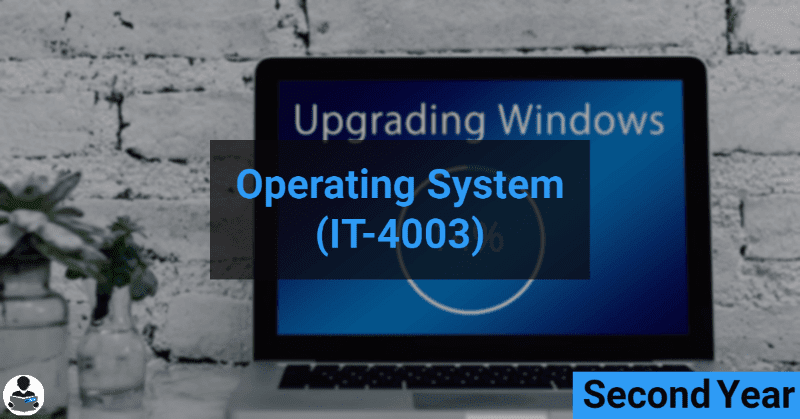Operating System (IT-4003)

rgpv bhopal, diploma, rgpv syllabus, rgpv time table, how to get transcript from rgpv, rgpvonline,rgpv question paper, rgpv online question paper, rgpv admit card, rgpv papers, rgpv scheme
RGPV notes CBGS Bachelor of engineering
Course Objectives:
This course provides a comprehensive introduction to understand the fundamental principles, techniques and approaches related to CPU, memory and files which requires the complete knowledge of operating systems. The course will highlight the various functionality of CPU scheduling, memory management, disk management and security of operating system.
Syllabus
UNIT 1:
Software, type of software, introduction to Operating Systems, function, services, types of
operating systems, kernel, system call, process concept, process states, process control block,
type of scheduler, context switching, threads, type of threads, multithreading model.
UNIT 2:
Process management, concepts of CPU scheduling, scheduling criteria, scheduling algorithms,
algorithm evaluation, multiple processors scheduling, cooperating process, Interprocess
communication, process synchronization, critical section problem, semaphores, classical
problems of synchronization
UNIT 3:
Deadlock, necessary conditions, resource allocation graph, deadlock prevention, deadlock
avoidance, deadlock detection, deadlock recovery, introduction to memory management, address
binding, logical and physical addressing, MMU, contiguous memory allocation, memory
management techniques, single partition, multi-partition, best fit, worst fit, first fit.
UNIT 4:
Paging, paging issues, TLB, page fault, segmentation, segmentation with paging, effective access
time, concepts of virtual memory, demand paging, demand segmentation, page replacement
algorithms, allocation of frames, thrashing, security in operating system, security techniques.
UNIT 5:
File system, file and directory concepts, attributes, operation, file type, directory structure,
LINUX file system, FAT, I-node, file access methods, allocation methods, free space
managements, disk management, disk access time, disk scheduling algorithm.
NOTES
- Unit 1
- Unit 2
- Unit 3
- Unit 4
- Unit 5
Course Outcomes:
On the completion of this course students will be able to understand:
1. The services and functions of operating systems.
2. Design issues associated with operating systems.
3. Various process management concepts including scheduling, synchronization, deadlocks.
4. The concept of multithreading, memory management, disk management and file system.
5. Protection and security mechanisms.
6. Various types of operating systems including Linux.
Books Recommended
1. Silberschatz,”Operating system”, Willey Pub.
2. S.Haldar and Alex A. Arvind “ Operating Systems” 2nd Edition Pearson.
3. D. M. Dhamdhere, ”Operating System- A concept- Based Approach”, TMH.
4. Pabitra Pal Choudhury, “Operating System-Principle and Design”, PHI Learning
List of Experiment
1. Program to implement FCFS CPU scheduling algorithm.
2. Program to implement SJF CPU scheduling algorithm.
3. Program to implement Priority CPU Scheduling algorithm.
4. Program to implement Round Robin CPU scheduling algorithm.
5. Program to implement classical inter process communication problem (producer consumer).
6. Program to implement classical inter process communication problem (Reader Writers).
7. Program to implement classical inter process communication problem (Dining Philosophers).
8. Program to implement FIFO page replacement algorithm.
9. Program to implement LRU page replacement algorithm
10. Program to implement LFU and optimal page replacement
You May Also Like
- ES-3001 - Energy, Environment, Ecology & Society
- IT-4002 - Data Base Management System
- IT-4004 - Communication Systems
- IT-4005 - Computer Architecture
- IT-4006 - Computer Programming-II (Dot Net Technology)
- IT-4007 - Programming Tools (Internal Assessment)
- IT-4008 - Professional Ethics (Internal Assessment)


